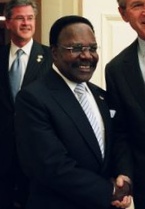 |
|---|
This article relies largely or entirely on a single source. (January 2019) |
The politics of Gabon takes place in a framework of a republic whereby the president of Gabon is head of state and in effect, also the head of government, since he appoints the prime minister and his cabinet. The government is divided into three branches: the executive headed by the prime minister (although previously grabbed by the president), the legislative that is formed by the two chambers of parliament, and the judicial branch. The judicial branch is technically independent and equal to the two other branches, although in practice, since its judges are appointed by the president, it is beholden to the same president. Since independence the party system is dominated by the conservative Gabonese Democratic Party.

In March 1991 a new constitution was adopted. Among its provisions are a Western-style bill of rights, the creation of the National Council of Democracy that also oversees the guarantee of those rights and a governmental advisory board which deals with economic and social issues. Multi-party legislative elections were held in 1990-91 even though opposition parties had not been declared formally legal.